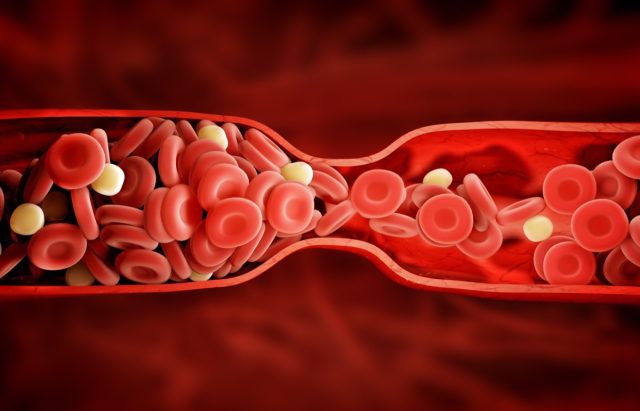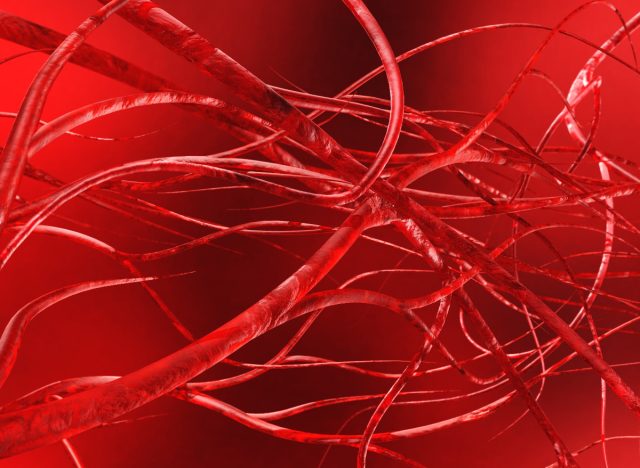What Causes A Blood Clot In Your Brain? An MD Weighs In

Developing a blood clot is one of those medical conditions that not everyone knows much about, but it is extremely serious—and scary. In fact, according to the Centers for Disease Control and Prevention (CDC), up to 900,000 Americans are adversely affected by venous thromboembolism (VTE), which occurs when blood clots develop in the veins. The CDC also reports that blood clots contribute to the deaths of 100,000 people on an annual basis, and three out of 10 people who develop a blood clot will experience another episode within a decade. So we have done some research on what exactly can cause a blood clot in your brain.
Most recently, 25-year-old Hailey Bieber was hospitalized as a result of a blood clot, starting with "stroke-like symptoms," which the celeb revealed in a statement on her Instagram Story. Bieber, who has 41.8M followers on Instagram, gave fans an update saying she's at home but suffered a "very small" blood clot, which created a lack of oxygen to her brain. Fortunately, Bieber continues to explain in the statement she "recovered completely within a few hours." But it's so important for all of us to understand the causes of developing a blood clot in your brain (in addition to other types of blood clots), so read on to learn more. And next, check out The 6 Best Exercises for Strong and Toned Arms in 2022, Trainer Says.
These are the many causes behind developing a blood clot

We spoke with Dr. Mike Bohl, MD, MPH, ALM who tells us there are many causes of developing a blood clot. The very long list "includes genetic conditions, atherosclerosis (plaques in the arteries, which develop because of high cholesterol), cancer, atrial fibrillation (irregular heartbeat), diabetes, having obesity, being pregnant, being sedentary, smoking, surgery, medication side effect, and more."
In addition, some birth control pills can increase the risk of forming a blood clot in women, as much as two to four times more. COVID-19 has presented a risk factor for blood clots as well. Dr. Bohl says, "It likely does this by increasing inflammation in the body, and there's also an increased risk of blood clots if you are sick enough to be more sedentary than usual (such as needing to stay in the ICU)."
Related: The 3 Sneaky Ways Losing Belly Fat Helps Your Heart Health, MD Says
This is what happens when you get a blood clot

What exactly happens when you develop a blood clot? According to Cleveland Clinic, a blood clot occurs in your veins or arteries when blood takes on a "partially solid" form rather than liquid. Although some clotting is normal in your body, gel-like clots can be extremely dangerous when they don't dissolve naturally. They can be treated with medication or surgery, but they can be fatal if not caught early.
Your blood vessels play a crucial role

To understand the seriousness of a blood clot, it's important to know the very crucial role that your complex blood vessels play. According to Study.com, they deliver proteins, nutrients, and gases to your entire body. If your blood vessels are not open enough to let your blood flow through freely at the pace it should, the slow-moving blood can clot, forming what's known as a thrombus. If a thrombus heads into your bloodstream, it becomes an embolus. This scenario can become a very dangerous situation.
A brain blood clot can attack your brain and lead to a stroke, as the lack of blood flow to your brain can prevent your brain tissues from receiving the amount of oxygen and nutrients they need. If too much time passes, your brain cells would start to die.
According to Narayana Health, a stroke brain clot is "a medical emergency," and needs to be treated by medical professionals as soon as possible. The sooner the emergency is addressed, the better the chances for recovering.
Related: Over 40? Quit These 5 Bad Habits For Better Heart Health, Expert Says
There's a rare kind of blood clot that can happen in the brain

Dr. Bohl notes there are actually two types of stroke: "ischemic (when blood flow is blocked) and hemorrhagic (when there is a bleed in the brain)." He goes on to explain that one of the most typical causes of ischemic stroke is "atherosclerosis in the carotid arteries, [which are] the arteries that [deliver] blood to the head and brain." He adds, "A rare type of blood clot in the brain is called cerebral venous sinus thrombosis," which happens when a blood clot develops in your brain's venous sinuses—"the areas that normally drain blood out of the brain." This kind of clot can lead to a greater amount of pressure in the blood vessels and a brain bleed.
Dr. Bohl concludes with, "This kind of blood clot (cerebral venous sinus thrombosis) has been seen in some patients after receiving the Johnson & Johnson COVID-19 vaccine, although it is extremely rare."









